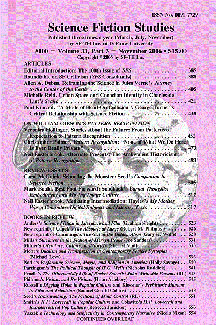 — or at least, that’s the view of a leading American professor, talking about a new article he’s written for Indiana’s Martinsville Reporter-Times.
— or at least, that’s the view of a leading American professor, talking about a new article he’s written for Indiana’s Martinsville Reporter-Times.
“Science fiction is no longer kids’ stuff, but serious literature,” acclaimed Jules Verne expert Arthur B. Evans, Laurel H. Turk, who is also Professor of Modern Languages at DePauw University, tells the paper. “It’s partly because we are living science fiction on a regular basis.”
Dr. Evans is featured in an article headlined “No longer considered pulp fiction” with reporter Ronald Hawkins describing Evans as a good example of the increased respectability that science fiction has gained over the years.
“Evans is a French professor at DePauw, but he also teaches a science fiction course at the university, one of many institutions of higher learning that offer such courses. Evans also is the managing editor of Science Fiction Studies, a scholarly journal that began at Indiana State in the 1970s and moved to DePauw in 1991 after time in Canada.” The respected journal which publishes critical articles and book reviews only, recently reached its 100th issue.
Evans discusses how science fiction has changed since the days when stories focused on the possibilities of space travel. “Today, there are all kinds of interesting themes,” he says. “There’s a lot about nano-technology, biological futures, viruses.”
The professor also discusses the difference between science fiction and fantasy. “It’s fantasy if it’s got magic and no perceivable laws of science in operation,” the professor tells the paper. “If it’s about the supernatural, it’s not science fiction. An example of the differences in literature would be that the Harry Potter books are fantasy, whereas Jules Verne’s ‘ 20,000 Leagues Under the Sea would be science fiction.”
• Read the complete text at the newspaper’s Web site.
The founder of downthetubes, which he established in 1998. John works as a comics and magazine editor, writer, and on promotional work for the Lakes International Comic Art Festival. He is currently editor of Star Trek Explorer, published by Titan – his third tour of duty on the title originally titled Star Trek Magazine.
Working in British comics publishing since the 1980s, his credits include editor of titles such as Doctor Who Magazine, Babylon 5 Magazine, and more. He also edited the comics anthology STRIP Magazine and edited several audio comics for ROK Comics. He has also edited several comic collections, including volumes of “Charley’s War” and “Dan Dare”.
He’s the writer of “Pilgrim: Secrets and Lies” for B7 Comics; “Crucible”, a creator-owned project with 2000AD artist Smuzz; and “Death Duty” and “Skow Dogs” with Dave Hailwood.
Categories: Science Fiction
 New “The Tomorrow People” novels launch this week
New “The Tomorrow People” novels launch this week  Ghastly Phantasms zine spotlights Quatermass
Ghastly Phantasms zine spotlights Quatermass  Andrew Skilleter’s new art book, Illuminart 3, spotlights more of his Doctor Who art
Andrew Skilleter’s new art book, Illuminart 3, spotlights more of his Doctor Who art  Look Back in Anxiety: Doctor Who, Season One, 2024 – Part One
Look Back in Anxiety: Doctor Who, Season One, 2024 – Part One